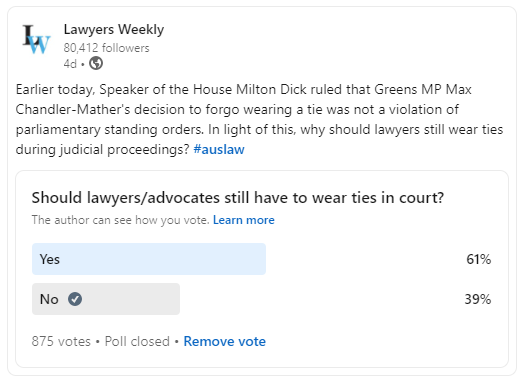Powered by MOMENTUM MEDIA
Following a determination last week that open-collared shirts do not constitute a “state of undress” in the House of Representatives, Lawyers Weekly asked readers whether forgoing a tie in court should be permissible.

Last week, newly elected Greens MP Max Chandler-Mather was interrupted in parliamentary question time, whilst asking Prime Minister Anthony Albanese about the nation’s housing crisis, by Nationals MP Pat Conaghan to make a point of order.
Discretion over dress code lies with the Speaker of the House in Federal Parliament, and Speaker Milton Dick MP dismissed the interjection.
In a statement issued, as reported by SBS, Mr Conaghan said: “This is not a barbecue. This is question time in the Australian Parliament. What next, board shorts and thongs? Maybe a onesie in winter.
“Some may say that it’s a minor matter to not comply with the dress standard, but what it says to many, including me, is that there is little respect for the tradition and history of our Parliament.”
Mr Chandler-Mather, for his part, told Nine that it was “completely bizarre” that he should be expected to “dress up like a businessman” in a place that is supposed to represent all Australians.
What do lawyers think?
Following this affair, Lawyers Weekly asked its audience, via a LinkedIn poll, if ties should still be worn by practitioners/advocates when in courtroom proceedings. The question was prompted not just in light of the idea that open collars are good enough for our parliamentarians, but also against the backdrop of ties becoming less common in legal offices.
At the time of closing, the poll results were as follows:

The poll conducted was, of course, not a scientific study. But it offers an interesting snapshot of lawyers’ prima facie views as to the required dress code when in court, or even more generally, as practitioners.
Maddocks senior associate Justin McGovern submitted that “lawyers are officers of the court, and ought to show respect for the institution accordingly”.
“Lack of respect by our parliamentarians should not form the basis for similar disrespect amongst the profession,” he opined.
“Ultimately, I consider it to be a matter of dutiful respect for the court as the institution responsible for administering justice in our society,” Mr McGovern told Lawyers Weekly.
IP Australia hearings officer Blake Knowles, who noted that while he does not work in the courts, said that while ties are a “ridiculous and impractical anachronism, they have some value in that they do embody a certain level of pride in your appearance and respect for the person you are meeting or the audience you are speaking to”.
“I couldn’t care less if someone wears a tie or not, but I generally wear ties unless I know someone well,” he said.
There were, however, legal professionals who do see value in removing the tie from such proceedings. Hall & Wilcox lawyer Aron Mazur said he was surprised to view the votes coming in, reflecting that “I guess we’re not quite there yet in terms of progressiveness!”
“I think it is about time we ditch the tie — a pointless relic of a time that has well and truly passed,” he suggested to Lawyers Weekly.
“Many law firms (like Hall & Wilcox) have ditched suits and ties long ago, and I think the courts should follow.”
“Maybe one step at a time though — ties before suits,” he joked.
Civil litigation and appeals lawyer Joel Payne noted that he would continue wearing a tie even if it wasn’t required of him, but added that he feels such formalities may only remain in place for a limited time.
“I like wearing a tie because a suit and tie is the most formal thing I have to wear. I would keep wearing a tie in court if it wasn’t mandatory,” he mused.
But, Mr Payne added, he doesn’t think it should be mandatory.
“Gendered dress codes are just ticking time bombs,” he said.
We're evolving — and so should your insights. Heads up — Lawyers Weekly is going premium from 1 May for just $5 a month. Stay informed without missing a beat. More information coming soon.

Jerome Doraisamy is the managing editor of Lawyers Weekly and HR Leader. He is also the author of The Wellness Doctrines book series, an admitted solicitor in New South Wales, and a board director of the Minds Count Foundation.
You can email Jerome at: